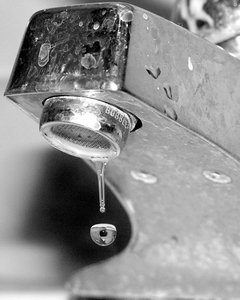|
Hard Water, Why Me?You’re probably familiar with the symptoms of hard water even if you haven't had your water tested yet. If you find scale clogging your shower head, crusty mineral buildup on your coffeemaker or tea kettle, a bathtub ring or soapy residue on your shower doors, and in many cases, dry skin problems, you probably have hard water in your home. A U.S. Geological Survey reports that over 85% of the water in our country is considered hard . Parts of the Pacific Northwest, and a few isolated areas around the country, have naturally soft water. Most of us have some degree of hardness in our water. Water is considered hard if it contains more than one grain per gallon (GPG) of one or more of the following minerals: calcium, magnesium, and iron. A grain is a measurement of weight. One grain is 1/7000th of a pound. An Aspirin tablet is five grains. Let’s say that your water has been tested and found to be 10 GPG. If we took a gallon of your water and boiled it until all of the pure water (steam) was gone, there would be enough mineral left to make two tablets the size of Aspirin tablets. This may not sound like much until you think of how many of those gallons come in contact with your plumbing and fixtures every day. When water is heated, or frozen, or allowed to evaporate, some of the hardness minerals will come out of the water or precipitate from the water. That’s why you’ll find spots on glasses and silverware, rock-like buildup on water-heating appliances, and cute little floaties from your ice cubes.
If you’re starting to recognize some of these symptoms then you may be wondering, “Why is my water hard?” It’s not your fault, you just happen to live in a part of the country where the earth is giving up it’s minerals to the water. You can blame it on the rain. Raindrops start off as really clean water; they don’t contain much more than two parts hydrogen and one part oxygen, H2O. Water that clean is very reactive, it wants to react or combine with everything it comes in contact with. While it drops through our atmosphere it combines with carbon dioxide to form a mild acid called carbonic acid. This makes it a little more aggressive. By the time it reaches the earth and percolates into the aquifer, it has dissolved a little bit of the earths minerals, making it hard water. Now that you know what hard water is it should be easy to figure out what soft water is; water that contains less than one GPG of calcium, magnesium, or iron. Actually it is as simple as that but there are so many misconceptions about soft water that it gets more complicated. I will clear up many of those misconceptions on a page I think I’ll call: Water Myths
Return from Hard Water to How To Purify Water
|

